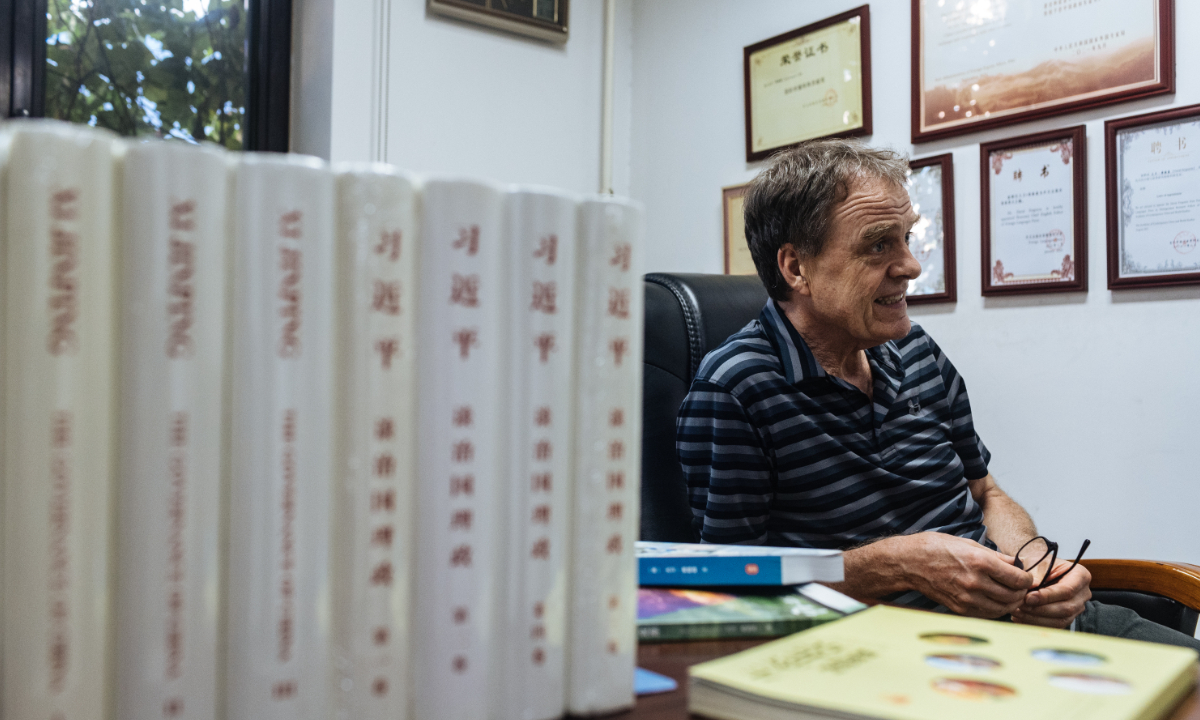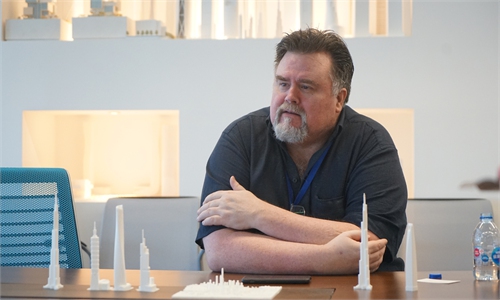IN-DEPTH / IN-DEPTH
Scottish writer's Chinese dream: To show the world a China worthy of trust, friendship, and respect
Editor's Note:
China's modernization has been an epic journey over the past decades. Under the leadership of the Communist Party of China (CPC), China has become an attractive destination for many foreigners. Many such expats in the country have fulfilled their career aspirations, while some have found love and started families in China.
Why do they choose to live in China? How do expats in China view and interpret China's achievements and persistence measured from various perspectives?
The Global Times interviewed multiple international residents in China from all walks of life, some of whom have made tangible contributions to China's development, to learn about their understanding of the essence of Chinese culture, and gain an insight into how far China has advanced in its pursuit of development and rejuvenation over the last decade.

China's modernization has been an epic journey over the past decades. Under the leadership of the Communist Party of China (CPC), China has become an attractive destination for many foreigners. Many such expats in the country have fulfilled their career aspirations, while some have found love and started families in China.
Why do they choose to live in China? How do expats in China view and interpret China's achievements and persistence measured from various perspectives?
The Global Times interviewed multiple international residents in China from all walks of life, some of whom have made tangible contributions to China's development, to learn about their understanding of the essence of Chinese culture, and gain an insight into how far China has advanced in its pursuit of development and rejuvenation over the last decade.

David Ferguson in his office with books of President Xi at Foreign Languages Press in Beijing Photo: Li Hao/GT
Some 16 years ago, when David Ferguson first came to China from Scotland, he was struck by what he saw.
"I thought China, other than some cities like Beijing and Shanghai, would be mostly poor peasants in the fields, but when I arrived in Jilin [in Northwest China's Jilin Province], I found that although it was very ordinary city, people enjoyed a reasonable life - for example the clothes and brands in the stores were no different from those in the UK. At that moment, I realized that my impression of China was not accurate," David said. This growing realization made him decide to tell the story of the real China to the world.
Since then, he has worked as a reporter and writer, covering the Wenchuan earthquake, the 2008 Beijing Summer Olympic Games, and the Shanghai World Expo. He has visited landmark Chinese cities and recorded the great changes happening in Chinese society in a series of books. He is also engaged in online debates on social media, exposing the prejudice and ignorance of some Westerners toward China, while relentlessly trying to reduce the estrangement and misunderstandings between different cultures.

David Ferguson covers the Wenchuan earthquake in Mianyang, Southwest China's Sichuan Province in May, 2008. Photo: Courtesy of David
As a journalist, a writer, and an English editor, an icebreaker in China-UK relations, an observer of both the Chinese and Western civilizations, and a witness to China's rapid development, David says China is his second home, a home where every citizen can dare to dream, and hope to fulfill their dreams.
His explorations, experiences, and observations over the last 16 years have made him realize that the biggest difference between the American and Chinese dreams is that the former is the dream of a few, and the gap between the haves and have-nots will never be bridged, while the latter gives everyone the belief that their children's generation will live a better life than their own.
Secrets behind China's development
When the Global Times reporters met David in his office at the Foreign Languages Press - part of China International Communications Group - he was quick to show his Chinese "green card." A permanent residence permit for foreigners living in China, it is dubbed the world's hardest-to-get "green card," only issued to foreigners of outstanding ability."It feels like a huge recognition of my contribution during the last decade," he told the Global Times.
Looking back on the important stages of his life in China, he said that even as a foreigner, he can understand why the country has witnessed seismic changes and achievements that other countries, especially those in the West, cannot imagine. The secret lies in the firm leadership of the Communist Party of China (CPC) and in the Chinese people with their diligence, creativity, and perseverance.
It has been 14 years since the devastating earthquake which rocked Sichuan, killing nearly 70,000 people, and leaving 18,000 missing and more than 370,000 injured. David still solemnly looks at the precious pictures he took in Wenchuan that are saved on his computer, testament to his work as a journalist.
"This is the one that left the deepest impression on me - a moment at which I was astonished by the resilience of the Chinese people." David points to a picture showing the bright smiles of several children and adults standing in front of shabby tents - their makeshift homes.
Over the years, David has witnessed the changing face of China by traveling to several key cities, where he has seen, heard, felt, and measured China's development for himself.
In Nantong, Jiangsu Province, David was impressed by resolute Chinese entrepreneurs, who started with nothing and built themselves into successful calling cards for China's business abroad; in Suzhou, a city that blends the very ancient and the very modern, he was amazed by the creativity of craftspeople ensuring the legacy of China's intangible cultural heritage; in Gansu, he was astonished by the industriousness of Chinese villagers working to eliminate poverty and revitalize rural areas.

David Ferguson at a Beijing business area Photo: Li Hao/GT
Mission to improve China's voice
This experience gave David a great sense of honor and satisfaction, indicating that his work and abilities are highly recognized in China. Of equal importance is that it provided him with a channel through which to understand China's development and convinced him that China should speak out even louder to the world about its system and explain why it works, to counter the hostile and negative narratives delivered by many Western media sources.
"The whole point of China's democracy is that it involves people in a much more active way than Western style democracy. China's democracy is about consultation, cooperation, and consensus. Ordinary people are invited to be actively involved in the process of creating legislation, for example, which is one of the fundamental purposes of governance. In China, democracy is a way of involving people actively and on an ongoing basis, whereas in the West, people participate in direct elections and there isn't much opportunity to get involved apart from that."
One of the biggest Western misunderstandings about China's democracy is an ignorance of the structure of the system. For example, very few people know anything about the direct elections that take place in communities at the grassroots, and how they function.
"They don't trouble themselves to inform themselves about this kind of thing because they're too busy criticizing China and too busy working from a position of intellectual and moral superiority to ever bother to find out what really happens in China," David said.
Having lived in China for many years, the things that have impressed David the most are the elimination of absolute poverty and the profound commitment to environmental improvements.
"Some 10 years ago, there were still one hundred100 million people living in absolute poverty - only about a dozen countries in the world have a population of more than 100 million. China has raised them all from absolute poverty. Poverty alleviation is a good example of what China does well, how it rolls strategies down through the different levels and then mobilizes everybody."
In response to some Western media complaints that China doesn't welcome foreigners, David gives a vivid example. "I invite myself into your home. Then I spend the afternoon smearing dog excrement on your walls. And then I want to start in your kitchen. You throw me out and I start to complain.... That's how the Western media behave in China. They never have anything positive to say about China, and then when China says all right, that's enough, they start complaining."
After receiving several honors - the Friendship Award from the Chinese government, the Special Contribution Award for Chinese Books (the highest award given to foreign experts in China's publishing industry), and the 8th Huilin Award - David said he has a Chinese dream: to improve China's voice in the international arena and continue to tell China's real story.


